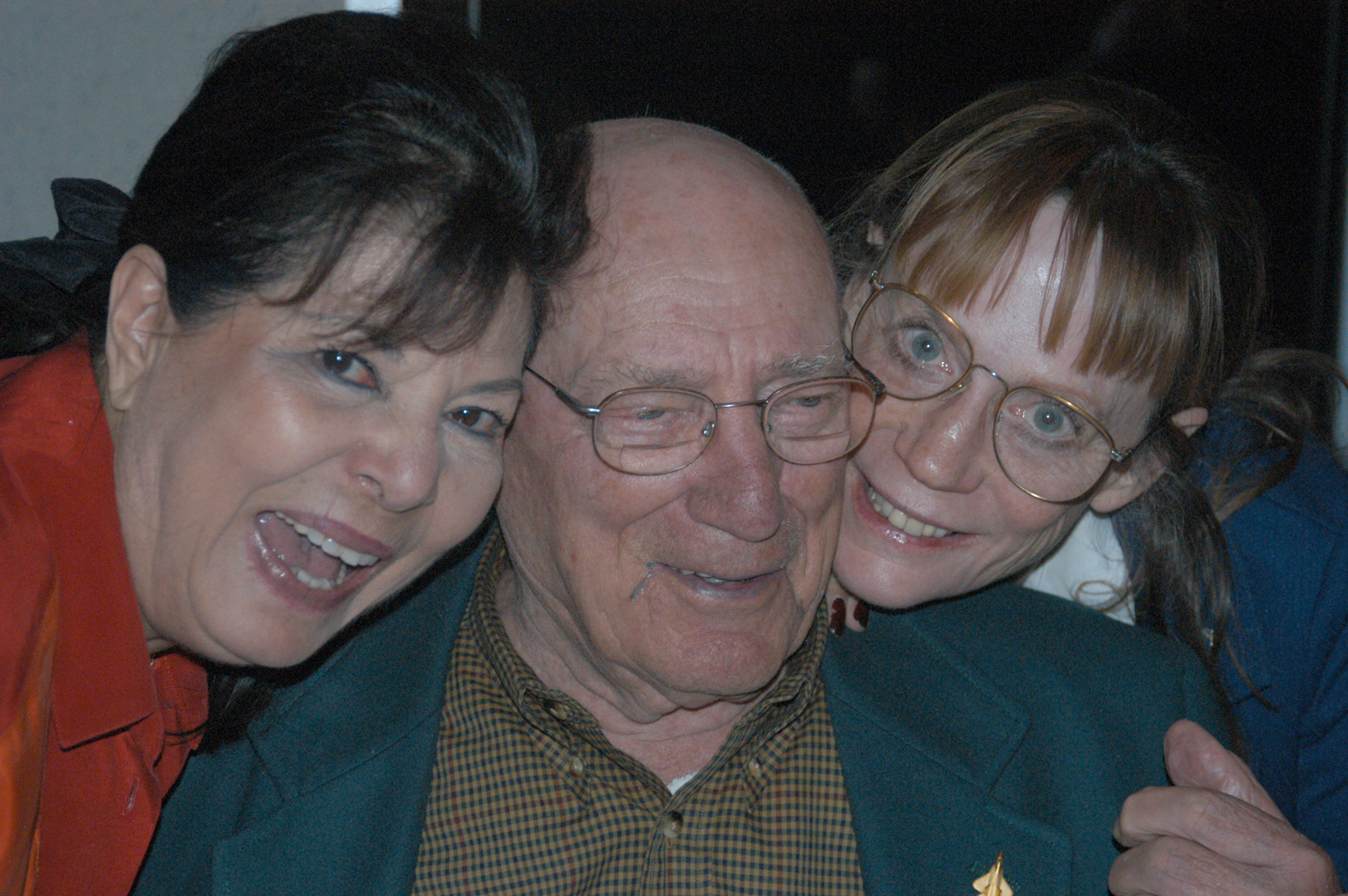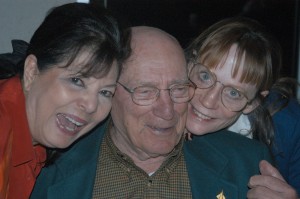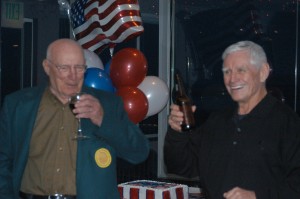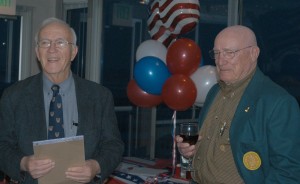By Clayton Moore
Springtime brings back a lot of memories for retired Air Force Col. William “Bill” Bower, a proud member of the legendary “Doolittle Raiders” that bombed Japan just four months after Pearl Harbor. That daring mission was conducted on April 18, 1942, providing the most visible retaliation for the Japanese raid and bolstering the spirits of both military personnel and civilians across the United States.
This April will mark the 65th anniversary of the famous raid. The remaining Doolittle Raiders will reunite from April 18 through 21 in San Antonio, Texas. The Yellow Rose Squadron of the Commemorative Air Force is sponsoring the event.
Bower, a resident of Boulder, Colo., recently celebrated another important occasion. February 13 was the decorated pilot’s 90th birthday. On that date, the Colorado Aviation Historical Society sponsored a modest birthday party for the airman. The party took place at the Runway Grill at Rocky Mountain Regional Airport (BJC). Friends and fellow pilots were there to celebrate with Bower.
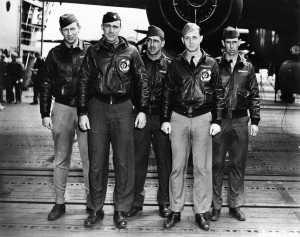
Doolittle Raiders, from left: Lt. William Pound Jr., navigator; William “Bill” Bower, pilot; Staff Sergeant Omer Duquette, engineer-gunner; Lt. Thadd Blanton, copilot; Technical Sergeant Waldo Bither, bombardier.
Bea Wilhite, president of the CAHS and a longtime friend of Bower, hosted the event. Among the invited guests were Col. Bower’s son, James Bower; CAHS laureate Col. Jack Wilhite; and CAHS directors Lance Barber, Dave Callender, Babette Andre and Michael McRhodes. John C. Lederhos, a WWII veteran who had been stationed in the Pacific, brought his family to meet one of his longtime heroes, after hearing about the celebration on KOA, a Denver talk-radio station. Dave Kempa of Charters by Air Denver provided his photography expertise to capture the night’s memories.
One of the day’s highlights came when Bower spoke by phone to Mayor Kevin T. Poland of Ravenna, Ohio, Bower’s hometown. The mayor, a longtime admirer of the Doolittle Raiders, announced to Bower that Feb. 13, 2007 had been proclaimed “Colonel William M. Bower Day” in Ravenna.
“We want to make sure we honor Ravenna residents who went on to serve our country,” Poland later said. “It’s great that Col. Bower still calls Ravenna ‘home.'”
CAHS members have been longtime admirers of Bower’s exploits and inducted him into the Colorado Aviation Hall of Fame in 2004.
“I enjoyed my career in the Air Force,” Bower said on his birthday. “I had some darn good jobs. I did the things that I had to do. I was just a good solider.”
The raid
Jimmy Doolittle himself inspired young Bill Bower to become a pilot. Born in 1917, he grew up in Ravenna, a small rural town, where he had little access to airplanes. But in 1932, Bower got a taste of adventure that would alter the course of his life.
Having saved up enough money for a train ticket to Cleveland, the 15-year-old traveled to the National Air Races, held from Aug. 27 to Sept. 5 that year. After arriving in Cleveland, he hitchhiked out to the airport, where he saw his future commander. Prior to his war exploits, Doolittle was already a famous civilian aviator and aeronautical engineer with a passion for the novel air races. At the 1932 competition, Doolittle took the Thompson Trophy in the Gee Bee R-1, nicknamed the Super Sportster. Granville Brothers Aircraft made the special purpose airplane exclusively for racing.
Upon graduating from Ravenna High School in 1934, Bower attended Hiram College and Kent State University, but never graduated. Instead, he earned what he called the “Highway 66 degree,” traveling to California to pursue his dream of flying. He spent the summer of 1940 in flying school and was commissioned Oct. 4, 1940, as a pilot in the nascent U.S. Army Air Corps, soon to become the U.S. Army Air Forces. After joining the 27th Bomb Squadron at Lowry Field in Denver, he was sent to Louisiana to learn to fly the new B-25 bomber.
After a return trip to California, Bower was sent to Pendleton, Ore., to learn to sink submarines. The disheartening assignment earned little success for the pilots. When a mysterious new assignment came up, Bower and many of his comrades volunteered, flying their bombers to Elgin Field in Florida.
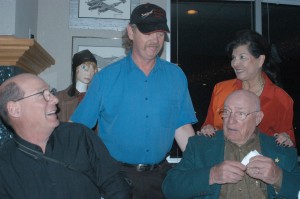
Those helping Bill Bower celebrate his birthday included his son, Jim Bower; Dwight Colburn, owner of the Runway Grill; and the party’s host, Bea Khan Wilhite.
The highly classified mission turned out to be Doolittle’s famous raid. In order to master the brand-new technique of taking off from an aircraft carrier, 140 volunteer pilots and crewman trained intensely for two months. On April 1, 1942, 16 highly customized B-25B Mitchell bombers, their five-man crews and maintenance personnel were loaded onto the USS Hornet at Alameda, Calif. A few days later, the ship joined with the carrier USS Enterprise, and an escort of cruisers and destroyers headed for Japanese waters.
The plan was to launch the planes closer to Japan. But on April 18, a Japanese boat radioed a warning to Japan, before being destroyed by an American cruiser. The admiral of the Enterprise messaged the Hornet, “Launch planes. To Colonel Doolittle and gallant command, good luck, and God bless you.”
Bower piloted the twelfth B-25 to take off. Each bomber spent about an hour over Japan, dodging antiaircraft fire and evading Japanese Zeros. The young lieutenant and his crew successfully bombed the Ogura city refinery, two factories and a large warehouse along the docks at Yokohama, using the B-25’s 500-pound explosive and incendiary bombs. It was a miracle that the crew completed its mission, with two enemy fighters trailing the plane inland and a series of barrage balloons exploding as it made its bombing runs.
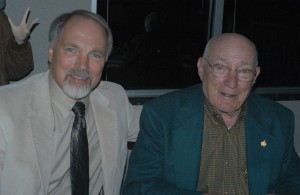
Dave Kempa (left) was busy capturing memories with his camera, but took time out to visit with the birthday boy.
On the flight to China, Bower spotted a Japanese weather boat. His crew strafed the vessel with the plane’s .50-caliber machine guns, sinking it. Unfortunately, the long flight and bad weather made for disastrous delays, forcing 11 of the 16 raiding crews to bail out, including Bower’s. The others crash-landed or ditched in the water, and nearly a dozen men were killed or captured.
Bower was one of 64 raiders who found safe haven—thanks to a little luck, a lot of stamina and the help of the Chinese. For his part in the most famous air raid in WWII history, Bower was awarded the Distinguished Flying Cross and a Bronze Star, among many other tributes. Following the raid, newly promoted Brig. Gen. Doolittle handpicked Bower to help him lead strategic bombing campaigns over North Africa and Italy. Bower remained in the Air Force after the war, serving in Newfoundland; California, Washington, D.C.; and Georgia, where he was base commander of Dobbins Air Force Base in Marietta. He retired from active service in 1966, returning to Colorado with his wife, the former Lorraine Ammon, with whom he raised four children. Bower remained good friends with Doolittle throughout his life and attended the general’s funeral at Arlington National Cemetery in 1993.
As they have since the 1940s, the survivors will begin this year’s anniversary with a toast. During a private ceremony, the Doolittle Raiders will read aloud the names of their fellow airmen before drinking from one of 80 specially engraved silver goblets.
The goblets, which are kept at the Air Force Academy in Colorado Springs, Colo., travel with a specially donated bottle of Hennessy cognac, bottled in 1896, the year of Doolittle’s birth. In keeping with Doolittle’s wishes, when only two of the Doolittle Raiders remain, the bottle will finally be opened, for a last toast.











